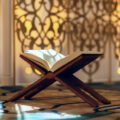Religious Education in secular Sweden
Religious Education in secular Sweden
There are two sides to the debate regarding religious education in Sweden. One side wishes to make religion a strictly private matter, whereas the other favours faith schools.
This article is part of our series on the role of religion in education across Europe.
Sweden is a secular country, and its past Christian identity cannot be felt in the school system as much as in other Nordic countries that are also secular, such as Norway. There is a strong focus on teaching religion in a pluralistic way,[1] and though this is also the case in the other Nordic countries,[2] Sweden has a particularly secular way of teaching religion, which is almost bordering on atheist.[3] Sweden officially separated church and state in 2000,[4] [5] and many see the increasing secularisation as a result of the growing belief in science, due to the Enlightenment, and as a result of a democratisation process of the country.[6] As a result of this secularisation, the country does not focus on teaching about Christianity in the education system as much, which separates the country from Norway that has a heavy focus on teaching about Christianity as a subject in school.[7]
RE in Sweden has been under fire for its ‘problematic’ approach to religion, as some critics see its strong secular focus as causing segregation within the classroom between religious and atheist pupils.[8] Though schools are told to be objective and neutral, they generally teach with a strong atheist attitude.[9] However, in 1996 in Sweden, parents were banned from withdrawing their children from obligatory religion subjects in school, a fact that continues today.[10] Despite the school system’s secular focus, there is thus still an issue with allowing people to opt in or out of RE. This has been under debate in Sweden and other Nordic countries for a while.[11]
Faith schools in Sweden
Sweden also has faith schools that educate children within a certain religious framework. However, the Swedish Social Democrats recently proposed to outlaw all faith schools that are not a part of the public school system.[12] This is a highly contended and debated area in Swedish society, especially when it comes to Muslim faith schools. For example, some Swedish politicians say that separating girls and boys as part of the school system, which some Muslim schools partake in, goes against Swedish values. Many critics believe that outlawing faith schools is a step in the wrong direction, and might actually lead to radicalisation of religious groups that are currently moderate.[13] As voices in the debate have pointed out, the European Human Rights Court gives parents the right to choose a school for their children that aligns with their religious values, and it is thus unlikely that faith schools will be outlawed completely.[14] However, according to some critics, it is still problematic that the debate targets a specific religious community in Sweden such as Muslim faith schools, as they believe this will only create more polarisation and divide in the country.[15]
Many have criticised the proposal to outlaw faith schools, including Eva Johnsson from the Swedish Christian Democrats, who says that faith schools make many children with a strong faith background feel safer and more represented in the school system. She additionally argues that faith schools should not all be ‘punished’ just because there are a few extreme schools in Sweden.[16] Many voices in the debate have actually argued that Sweden would benefit from more faith schools and a more diverse religious structure in society, as this would mirror the freedom of religion that the country strives to allow its citizens.[17]
Secularisation mission
Some see the proposals of outlawing faith schools in Sweden as a part of the government’s secularisation plan, rather than just a targeting of specific religious communities.[18] For instance, in 2016, a school decided to ‘censor’ a Christian Christmas song by removing all religious symbolism, leading to a scandal in the country.[19] Some critics commented that this type of censoring was taking secularism too far.[20]
It seems that there are two sides to the Swedish debate regarding education and religion. One side wishes to secularise the education system fully, and make religion a strictly private matter that does not interfere with state-funded institutions such as public schools. This side tends to favour the more atheist teaching of religion, it seems. The other side, however, sees secularism as an expression of religious freedom and a ‘de-Christianisation’ of Sweden. It comes across that this side tends to favour more faith schools and more freedom of religion in the education system. They also seem to believe that a diverse set of faith schools should be allowed and that people should have the right to express religious opinions in the public realm. This leads back to a bigger global debate about secularisation that asks if it should lead to an expression of freedom of – or from – religion.
Our team of analysts conducts research on topics relating to religion and society. In April, May and June 2021, we are focusing on the subject of education. Find out more on the EARS Dashboard.
[2] Nordisk balancegang om religionsundervisning.
[3] Religionsundervisningen får hård kritik
[4] Hur sekulariserad är Svensson?
[6] Sekularisering | Sekularisering och religionskritik | Religion
[7] Sekularisering | Sekularisering och religionskritik | Religion
[8] Religionsundervisningen får hård kritik
[9] Religionsundervisningen får hård kritik
[10] Nordisk balancegang om religionsundervisning.
[11] Nordisk balancegang om religionsundervisning.
[12] Svenske socialdemokrater vil forbyde religiøse friskoler: Præster og imamer skal ikke bestemme
[13] De religiøse friskoler er under pres i Sverige
[14] De religiøse friskoler er under pres i Sverige
[15] Svensk forbud mod religiøse friskoler kaldes for kollektiv straf
[16] Svensk forbud mod religiøse friskoler kaldes for kollektiv straf
[17] Svensk debattør: Der er brug for flere religiøse friskoler
[18] Svensk skole kritiseres for censur af julesalme






